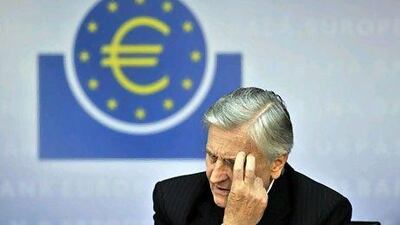European leaders are preparing additional measures to help the continent's banks stay liquid as Greece edges closer to a sovereign default.
Jean-Claude Trichet, the outgoing president of the European Central Bank (ECB), yesterday said the regulator would purchase €40 billion (Dh195.4bn) of covered bonds and offer 12 and 13-month loans to banks in an effort to keep them flush with cash.
Shoring up banks' balance sheets and ensuring they have enough capital to withstand Europe's sovereign debt crisis has been a priority for months. The IMF has urged further recapitalisation of euro-zone banks following EU stress tests in July, but finance ministers have resisted the move until recently.
Mr Trichet announced the new measures for banks following the ECB's decision yesterday to leave benchmark interest rates at 1.5 per cent. That was expected, but calls have been intensifying for the ECB to reverse two rises in interest rates this year to spur Europe's economy as the debt crisis threatens to spread.
"The economic outlook remains subject to particularly high uncertainty and intensified downside risks," Mr Trichet warned during his speech yesterday, his last before he relinquishes his post to Mario Draghi, the Italian central bank governor, at the end of the month.
"A very thorough analysis of all incoming data and developments over the period ahead is warranted," he said.
Markets responded positively to the moves, with most European stock indexes up by more than 1 per cent in late-afternoon trading yesterday. The euro, however, dropped to a near 10-year low against the yen after the ECB rate decision.
Many analysts still expect the ECB to cut rates. One factor holding the ECB back, some say, is euro-zone inflation, which registered an annual rate of 3 per cent last month. Central banks typically move rates up to curb inflation; cutting them, conversely, can fuel rises in consumer prices.
"With inflation at 3 per cent, the bank might wait a couple of months before cutting rates," said Jennifer McKeown, a senior European economist at Capital Intelligence in London.
The Bank of England also increased the size of its bond-buying programme by £75bn (Dh423.65bn) yesterday to £275bn while keeping benchmark interest rates steady at 0.5 per cent.
Greece is in dire need of more aid from the IMF, EU and ECB - the so-called troika of international bodies that have lined up billions in aid. Auditors from the troika are now in Greece evaluating the country's deficit-reduction efforts, and a decision is expected soon on a critical aid instalment.

